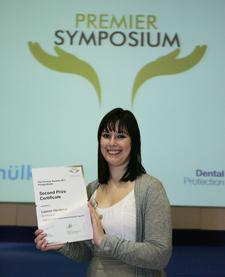 Lauren's project won her 2nd prize in the Postgraduate category of the 2011 Dental Protection and Schülke Premier Awards.
Lauren's project won her 2nd prize in the Postgraduate category of the 2011 Dental Protection and Schülke Premier Awards.
Lauren Hardwick studied Dentistry at the University of Sheffield, graduating in 2009. She completed her Audit on Mental Capacity whilst working as a Senior House Officer/Dental Foundation Year Two at the Norfolk and Norwich University Hospital, based in the Oral and Maxillofacial Surgery Department. Lauren's interest in the Legal aspects of medicine and dentistry arose from the recognition with her Consultant that the consent of people who lacked mental capacity was not following standards required and decided to conduct this Audit to assist Doctors with their competence in this area. Lauren is now working as an Associate Dentist near Norwich.
This is a brief analysis of a survey undertaken by hospital staff.
Introduction
This Audit was undertaken to look at Doctors' assessment of Mental Capacity. It is a requirement that patients are assessed for their capacity to consent, the presumption being that patients have the capacity to consent. The GMC, Department of Health and our hospital have Guidelines on this issue, which we are meant to follow.
A person must satisfy four key criteria to have the capacity to make decisions, these are:-
1) Understand the information we give them.
2) Retain the information,
3) Know that a decision must be made,
4) Be able to communicate the decision.
The Mental Capacity Act 2005 was introduced in 2007. This was designed to protect those who can't make decisions for themselves. Its purposes are to allow adults:-
- to make as many decisions as they can for themselves,
- to make advance directives so they can decide what treatment they have in the future, when they cannot make decisions for themselves or appoint a person to make decisions in the future,
- to allow local authority / NHS Boards to appoint an independent mental capacity advocate making decisions when the patient has no family / friends.
Aims and Objectives
The aim of this survey was to assess the knowledge of hospital medical staff in relation to the Mental Capacity Act. The Objectives were to evaluate the level of competence of medical staff with reference to the guidelines of the GMC and local hospital guidelines. In addition the educational needs of doctors in training and consultant staff were identified.
Methodology
A 14 part questionnaire was designed in collaboration with the Trust's Legal Department. Approval was obtained and the project was registered prior to circulation of the questionnaire.
Results
From the results of this survey it suggests that staff members do need training in this as only 2% of the doctors surveyed met our standard of 100% conforming with GMC Guidelines.
Looking at the results of this survey it can be seen that areas of staff training required are:-
1) How to proceed with patients you are unsure have the capacity to consent,
2) The principles of checking if a patient has the capacity to consent,
3) Which consent form to complete when a patient is unable to consent for themselves,
4) Lasting Power of Attorney,
5) Advance Directives,
6) Independent Mental Capacity Advocates,
7) How to complete the write up process when you have assessed mental capacity in those whose capacity to consent is called into question,
8) Where to find our hospital's policies and access help with issues on capacity and consenting,
9) Information on our hospital's policies in consenting and capacity.
Almost all doctors understood the common law doctor of necessity and so this would only need briefly covering.
Conclusion
The study demonstrated how most staff needed staff training / an update on the assessment of Mental Capacity. From this questionnaire we are able to help the Legal Department at the hospital target training in this area effectively.